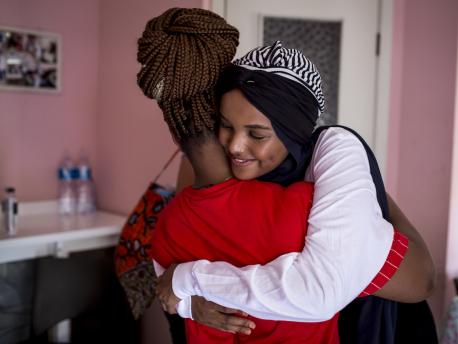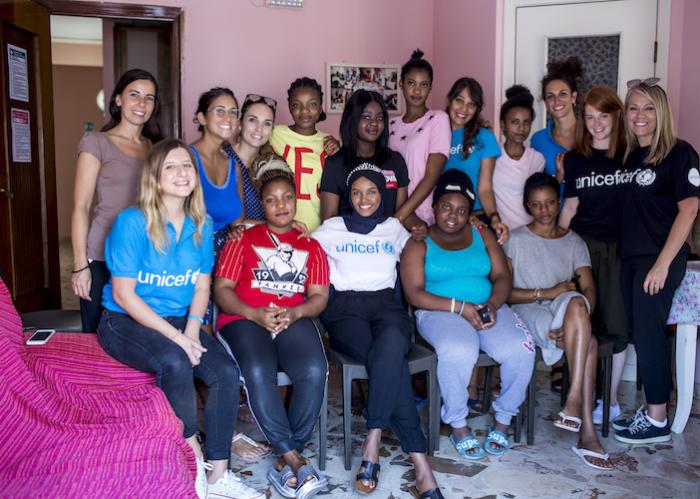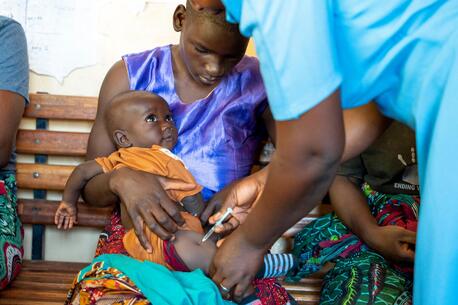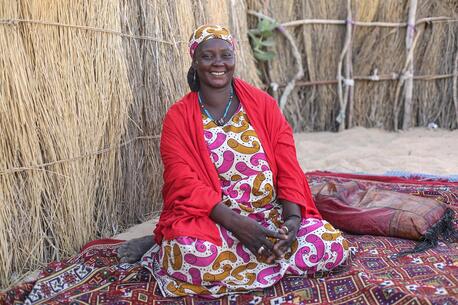
Refugees Need Our Support Now More Than Ever
Born a refugee herself, UNICEF Ambassador Halima Aden speaks out in support of the world's most vulnerable children as they face the threat of COVID-19.
I was born in Kakuma, a settlement in northwestern Kenya that's home to 200,000 refugees and asylum seekers displaced by war, famine and persecution. Our families came from nearly 20 countries including Rwanda, Burundi, Ethiopia, the Democratic Republic of the Congo, Eritrea, Uganda and Somalia, where my parents lived until my mother's village was burned to the ground during heavy fighting in the early 1990s.
We came together as refugees from so many countries, but our parents all shared the same desire: to raise their children in safety and to live and work in peace.
We came together as refugees from so many countries, but our parents all shared the same desire: to raise their children in safety and to live and work in peace.
Now COVID-19 is making life even more perilous for refugees around the world. Social distancing is not an option for families in transit or those packed into overcrowded camps. Safe water, soap and handwashing facilities are precious resources.
There are only a few confirmed cases in Kakuma at the moment, but epidemiologists say COVID-19 transmission is accelerating in many countries across Africa. The virus does not recognize borders. Health systems are already strained. Testing is extremely limited and health workers lack vital resources like personal protective equipment.
Not long ago, the novel coronavirus reached the Rohingya refugee camps in Cox's Bazar, Bangladesh, where close to one million refugees live. The world holds it breath, waiting to see what COVID-19 will do to the most vulnerable among us.
Refugee children need support and protection to help them survive the trauma they've experienced and the stigma and violence that sometimes awaits them.
Children are less likely to get sick from the coronavirus, but they're in danger of becoming its hidden victims. The educations and futures of an entire generation of children hang in the balance. In some cases, children are going without meals or clean water because of school closures. Children are now more at risk of neglect, abuse, gender-based violence and child marriage as their families sink further into economic hardship.

On August 7, 2019, UNICEF Ambassador Halima Aden (in white shirt, center) met with young asylum seekers at a UNICEF-supported reception center in Palermo, Italy. The young women told personal stories of the difficult circumstances that forced them to leave home and their harrowing journey across the Mediterranean. They also shared their hopes for the future: many said they plan to become lawyers. © Photo courtesy of Francesco Alesi for UNICEF USA
Growing up in Kakuma, UNICEF was always there for us. UNICEF works with partners in Kakuma to provide vital services — safe water, nutrition, early childhood programs, education, counseling, sanitation, immunization, medical care — for kids whose lives have been disrupted by conflict. Before I could sign my own name, when I was literally doing X for my name, I could spell UNICEF.
Growing up in Kakuma, UNICEF was always there for us.... Before I could sign my own name, when I was literally doing X for my name, I could spell UNICEF.
Stopping the spread of infectious disease in humanitarian settings is UNICEF's specialty — a top priority for every emergency UNICEF response. Before COVID-19 was declared a global health emergency, UNICEF had already rushed six metric tons of supplies to the front lines. UNICEF is ramping up its water, sanitation and hygiene (WASH) programs in all regions, and working closely with the World Health Organization and country health ministries to strengthen local health systems. In the past months, more than 2.9 billion people have been reached with messaging about how to prevent the spread of the novel coronavirus.
"Countries battling the pandemic at home are rightly prioritizing people living in their own communities," United Nations Under-Secretary-General for Humanities Mark Lowcock said in March. "But the hard truth is they will be failing to protect their own people if they do not act now to help the poorest countries protect themselves."
I know what it's like to be a refugee, and what it's like to be fortunate enough to leave the refugee camp. When I was 7, my mother and my younger brother and I received permission to emigrate to the U.S. I was the homecoming queen at my high school in St. Cloud, Minnesota, and the first contestant to wear a hijab at the Miss Minnesota USA pageant. Now I'm a model and a UNICEF Ambassador. I use my voice to speak out for the millions of other people, other girls my age, who stayed behind.
I made it out, so I want to make the most of my journey to America. That's why I'm standing up for all the refugee children who deserve equitable access to the support and services they need, so they can grow up healthy and make their own contribution to the world. Please stand with me.
Help UNICEF be there for refugees around the world. Your contribution will make a difference.
Top photo: UNICEF Ambassador Halima Aden hugs a young asylum seeker at a UNICEF-supported reception center in Palermo, Italy on August 7, 2019. © Photo courtesy of Francesco Alesi for UNICEF USA


